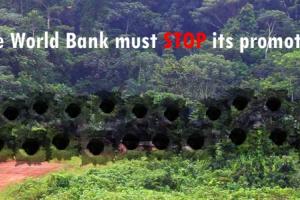Plantations are forests in uniform. They look like soldiers all lined up in ranks, and that is what they are. Dressed in green, they march off to the world market. The hymns that sing their praises in the name of our Mother Earth are lies. Industrial forests are to natural forests what military music is to music, and what military justice is to justice.
Eduardo Galeano, writer, Uruguay
Large-Scale Tree Plantations
Industrial tree plantations are large-scale, intensively managed, even-aged monocultures, involving vast areas of fertile land under the control of plantation companies. Management of plantations involves the use of huge amounts of water as well as agrochemicals—which harm humans, and plants and animals in the plantations and surrounding areas.
Bulletin articles
30 September 2009
Large-scale tree plantations do not generate jobs because they always involve as much mechanization as possible. For example, the Veracel Celulose Company in Brazil generates 1 direct job per 130 hectares of eucalyptus. On the other hand coffee plantations, very common in Brazil, are able to create up to one job per hectare.
Bulletin articles
30 September 2009
Why is this statement simply not true?
Monoculture tree plantations cannot ever improve on the natural environment that is eliminated when plantations are established.
Bulletin articles
30 September 2009
A typical propaganda disseminated by business interests and governments in many tropical countries is to say that plantations will relieve pressure on native forests. They claim that with enough plantations, native forests would eventually be left alone, as the plantations would provide sufficient wood to avoid the need of extracting timber from native forests.
Bulletin articles
30 September 2009
The need for paper is not growing. We should not confuse consumption levels with need. In rich countries, we already use far more paper than we need, and the vast bulk of it is wasted. The real need is to reduce demand for paper, to use this precious resource more efficiently and to encourage recycling systems that ensure paper fibres are reused over and over again. Of course, there are countries and communities where paper consumption is currently well below what is required for education and democratic engagement, and they have a right to use more.
Bulletin articles
30 September 2009
The experience of Ecuador in areas where large-scale pine plantations have expanded shows that, far from providing women with opportunities, women have been adversely affected by them in various ways.
Bulletin articles
30 September 2009
In the area of tree plantations, the FSC has become the main body responsible for granting a certificate to plantations assessed as “environmentally responsible, socially beneficial and economically viable.”
The insurmountable problem of this “green seal” granted by the FSC is that it certifies what intrinsically can never be either socially beneficial or environmentally sustainable: large scale monoculture tree plantations.
Bulletin articles
30 September 2009
The expansion of oil palm plantations usually takes place at the expense of transforming natural ecosystems, particularly tropical rainforests. This has disastrous consequences, firstly because these forests are the home of very traditional peoples who have learnt over thousands of years to understand the forest and to use it, respecting its natural dynamics.
Bulletin articles
30 September 2009
At a very fundamental level, dealing with climate change involves making a dramatic and immediate reduction in the amount of fossil fuels that we extract and burn. The idea of using tree plantations to neutralise these emissions is counterproductive as it effectively provides a false excuse to keep on combusting more coal, oil and gas. As long as there is room for more plantations (regardless of their impact on communities and ecosystems) then business interest want us to believe that we can keep on building more oil refineries and coal mines.
Bulletin articles
30 September 2009
From a climate perspective, tree plantations not only are not a solution. They also add yet more problems. It is impossible to predict how much carbon any plantation could remove from the atmosphere, and for how long. Unlike subterranean oil or coal, carbon stored in trees is "fragile": it can quickly reenter the atmosphere at any time through wildfires, storms, insect infestation, disease and decay.
Bulletin articles
30 September 2009
There is a particular arrogance associated with this rationale. It implies that scientists and corporations know more about improving trees than has been achieved by 3 billion years of evolution, and ignores the fact that some tree species being engineered have genomes many times longer than the human genome. But really what they are saying is "genetic modification of trees is useful and necessary for making more money."
Other information
17 September 2009
Industrial oil palm plantations are a major cause of deforestation, destroy local communities livelihoods and and accelerates climate change. The World Bank must stop its promotion.
-

